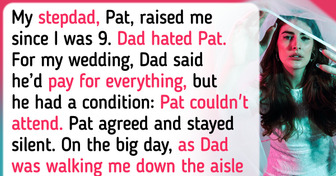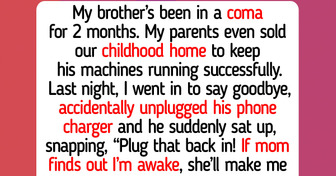I Told My Stepdad to Skip My Wedding — I Didn't Expect the Brutal Consequence


In today’s article, we dive into a story that might sound like it’s ripped from a sitcom script, but instead reveals a troubling reality many women still face in 2024. Our reader Maria shares a tale of romance gone awry, featuring white sheets, misguided intentions, and a boyfriend’s startling misconception about menstruation. At first glance, this might seem like a humorous anecdote about relationship quirks. But as we peel back the layers, we uncover a more serious issue.

Maria, your letter has sparked a flurry of discussion among our editorial, touching on issues that go far beyond simple relationship advice. The situation you described with Jake and his sheet-covered furniture is more than just an unusual anecdote — it’s a vivid illustration of the persistent stigma surrounding menstruation in our society.
Your experience provides an opportunity to explore the intersections of gender, education, and personal boundaries. Let’s dive deeper into this complex situation and examine why your reaction was not only justified but necessary for your well-being and self-respect.
This is a common experience in relationships, especially when we’re eager to see the best in our partners. Jake’s consistent excuses to avoid your presence during your period were early indicators of his discomfort and misunderstanding about menstruation. These subtle signs are often our subconscious picking up on incompatibilities or problems before our conscious mind is ready to acknowledge them.
It’s crucial to pay attention to these early warnings in future relationships. Trust your instincts when something feels off — they’re often trying to protect you. Reflect on why you might have overlooked these signs initially. Was it a desire to make the relationship work? Fear of being single? Or perhaps a societal pressure to be accommodating? Understanding your motivations can help you make more informed decisions in future relationships.
His casual explanation, equating your menstrual cycle to a potential furniture-ruining disaster, reveals a deep-seated misunderstanding of how periods work. This goes beyond mere ignorance — it suggests that your natural bodily functions are somehow dirty or dangerous.
Your reaction to this display was entirely appropriate. It’s not just about the inconvenience or the aesthetics of a sheet-covered apartment. It’s about the message this action sends: that your body, in its natural state, is something to be feared and protected against. This kind of attitude can have profound impacts on a person’s self-esteem and body image. You were right to feel insulted and degraded by this display.
It’s a stark reminder of how misconceptions about menstruation can be passed down through generations, even in well-meaning families. This generational transmission of misinformation highlights the importance of comprehensive, accurate sex education in schools and open, honest conversations about bodies and bodily functions in families.
While it explains Jake’s actions, it doesn’t excuse them. Adults have a responsibility to question the beliefs they were raised with and seek out accurate information. Your attempt to educate both Jake and his mother was admirable, even if it fell on deaf ears. Sometimes, we must be the ones to break harmful cycles, even when it’s uncomfortable or met with resistance.
The emotional labor involved in constantly explaining and defending your bodily functions can be exhausting and demoralizing. This burden often falls disproportionately on women, who are expected to patiently explain their experiences to those who can’t relate to them.
Jake’s dismissive attitude towards your feelings, laughing with his friend about how “emotional” you were being, shows a lack of respect for your perspective and an unwillingness to engage seriously with your concerns. This dismissal is a common tactic used to avoid confronting one’s own biases and misconceptions. You’re not overreacting by refusing to shoulder this burden in your relationship. It’s okay to expect your partner to do their own research and emotional work.
You’ve shown that you won’t tolerate being treated as unclean or problematic because of your natural bodily functions. This act of self-respect is powerful and sets a standard for how you expect to be treated in future relationships.
Don’t let anyone, including mutual friends, make you doubt your decision. Those who think you overreacted may not fully understand the implications of Jake’s behavior, or may be operating under similar misconceptions about menstruation. Your decision wasn’t just about sheets — it was about respect, understanding, and equality in your relationship.
Give yourself time to process these feelings. Consider talking to a therapist or counselor if you find these emotions difficult to navigate on your own. As you move forward, reflect on what you’ve learned from this experience. How can you apply these lessons to future relationships? How has this changed your understanding of your own boundaries and what you’re willing to accept from a partner?
Moving forward, carry this self-respect with you. You deserve a partner who celebrates all aspects of you, including your biology. Remember, the right person will never make you feel less because of your body’s natural functions. Your experience, while difficult, has made you stronger and more aware of your own worth. Trust in that strength as you continue your journey.
And for those curious about the history of menstrual management, stay tuned for our upcoming feature on pre-modern feminine hygiene practices. You’ll be amazed at the ingenious (and sometimes shocking) methods women used throughout history. From Ancient Egypt to Victorian England, the creativity and resilience of women shine through in unexpected ways.











